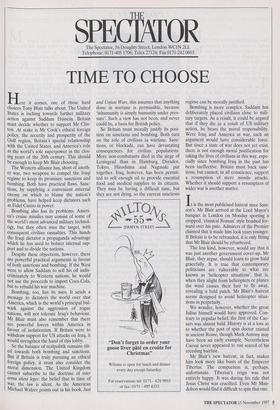SPECTAT THE OR The Spectator, 56 Doughty Street, London WC1N 2LL
Telephone: 0171-405 1706; Telex 27124; Fax 0171-242 0603
TIME TO CHOOSE
Here it comes, one of those hard choices Tony Blair talks about. The United States is inching towards further military action against Saddam Hussein. Britain must decide whether to support Mr Clin- ton. At stake is Mr Cook's ethical foreign policy, the security and prosperity of the Gulf region, Britain's special relationship with the United States, and America's role as the world's sole superpower in the clos- ing years of the 20th century. This should be enough to keep Mr Blair choosing.
The Western alliance has, short of anoth- er war, two weapons to compel the Iraqi regime to keep its promises: sanctions and bombing. Both have practical flaws. Sanc- tions, by supplying a convenient external enemy on which to blame the nation's Problems, have helped keep dictators such as Fidel Castro in power.
Bombing also has its problems. Ameri- ca's cruise missiles may consist of some of the world's most advanced military technol- ogy, but they often miss the target, with consequent civilian casualties. This hands the Iraqi dictator a propaganda advantage which he has used to bolster internal sup- port and to divide the nations.
Despite these objections, however, there are powerful practical arguments in favour of both sanctions and bombing. If the West were to allow Saddam to sell his oil indis- criminately to Western nations, he would not use the proceeds to import Coca-Cola, but to rebuild his war machine.
Bombing, too, has its uses. It sends a message to dictators the world over that America, which is the world's principal bul- wark against the aggression of rogue nations, will not tolerate Iraq's behaviour. Mr Blair must also remember that there are powerful forces within America in favour of isolationism. If Britain were to withdraw support for US attacks on Iraq, it would strengthen the hand of this lobby.
So the balance of realpolitik remains tilt- ed towards both bombing and sanctions. But if Britain is truly pursuing an ethical foreign policy, it must also consider the moral dimension. The United Kingdom cannot subscribe to the doctrine of inter arena silent leges: the belief that in time of war, the law is silent. As the American Michael Walzer points out in his book, Just and Unjust Wars, this assumes that anything done in wartime is permissible, because `inhumanity is simply humanity under pres- sure'. Such a view has not been, and never could be, a basis for British policy.
So Britain must morally justify its posi- tion on sanctions and bombing. Both turn on the role of civilians in wartime. Sanc- tions, or blockade, can have devastating consequences for civilian populations. More non-combatants died in the siege of Leningrad than in Hamburg, Dresden, Tokyo, Hiroshima and Nagasaki put together. Iraq, however, has been permit- ted to sell enough oil to provide essential food and medical supplies to its citizens. They may be having a difficult time, but they are not dying, so the current sanctions regime can be morally justified.
Bombing is more complex. Saddam has deliberately placed civilians close to mili- tary targets. As a result, it could be argued that if they die as a result of US military action, he bears the moral responsibility. Were Iraq and America at war, such an argument would have considerable force. But since a state of war does not yet exist, there is not enough moral justification for taking the lives of civilians in this way, espe- cially since bombing Iraq in the past has been ineffective. Britain must back sanc- tions, but cannot, in all conscience, support a resumption of mere missile attacks. Whether it should support a resumption of wider war is another matter.
It is the most publicised haircut since Sam- son's. Mr Blair arrived at the Lord Mayor's banquet in London on Monday sporting a cropped, 'classical Roman' style brushed for- ward over his pate. Admirers of the Premier claimed that it made him look years younger. If Britain is to be rebranded, it is only fitting that Mr Blair should be rebarbcred.
The less kind, however, would say that it was just another government cover-up. Mr Blair, they argue, should learn to grow bald gracefully. It is true that contemporary politicians are vulnerable to what are known as 'helicopter situations', that is, when they alight from helicopters or planes the wind causes their hair to fly away, revealing a bald patch. Mr Blair's haircut seems designed to avoid helicopter situa- tions in perpetuity.
We wonder, however, whether the great Julius himself would have approved. Con- trary to popular belief, the first of the Cae- sars was almost bald. History is at a loss as to whether the post of spin doctor existed in ancient Rome, though Mark Antony may have been an early example. Nevertheless Caesar never appeared to run scared of his receding hairline.
Mr Blair's new haircut, in fact, makes him look more like busts of the Emperor Tiberius. The comparison is, perhaps, unfortunate. Tiberius's reign was not entirely happy. It was during his rule that Jesus Christ was crucified. Even Mr Man- delson would find it difficult to spin that one.










































































 Previous page
Previous page